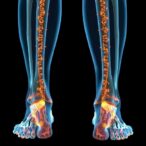
In a groundbreaking study that has implications for the evolving field of nursing and patient care, researchers have delved into the effectiveness of graded nursing interventions tailored to address psychological stress responses in patients undergoing surgical procedures for primary liver cancer. Titled “The impact of graded nursing interventions based on quantitative risk assessment on psychological stress responses in patients undergoing resection for primary liver cancer,” this study from Zhang et al. sets a formidable foundation for both clinical practice and future research avenues.
Cancer surgeries are daunting experiences, particularly in the case of primary liver cancer, which often carries a heavy psychological burden. The pre-operative phase can be fraught with anxiety and stress, impacting not only the mental well-being of patients but also their physiological responses and overall recovery. The nuance of managing such stress effectively can determine the trajectory of a patient’s post-operative journey, making this research particularly significant.
Traditionally, the psychiatric components of cancer treatment often receive less focus compared to the physical aspects. However, recent data suggests that understanding and mitigating psychological responses are crucial for enhancing patient outcomes. This study adopts a methodical approach, utilizing a graded intervention strategy which aligns nursing responses with individual patient risk assessments. By placing quantitative measures at the heart of the interventions, the research represents a significant step toward personalized patient care.
The authors of the study recognize the need for a structured method to quantify psychological stress levels, which can fluctuate dramatically among patients. They propose a model that incorporates standardized assessment metrics, allowing healthcare providers to tailor their nursing interventions based on individual risk profiles. The results from this model reveal that when nursing interventions are personalized, patients report lower levels of anxiety and psychological distress, which in turn facilitate better surgical outcomes.
Furthermore, the research offers insights into how significant mental wellness is prior to undergoing surgical procedures. Among the plethora of findings, one key observation is that patients who engaged in graded nursing interventions felt more empowered and involved in their care, as opposed to those who experienced a more generalized, one-size-fits-all approach. The concept of patient empowerment is vital, as it correlates strongly with overall satisfaction and perceived quality of care.
As they delve deeper into the methodology, the authors delineate specific interventions that were employed throughout various phases of care. These interventions ranged from pre-surgical counseling, anxiety management techniques, and other supportive strategies that are all tailored according to individual assessments. This structured approach not only improves patient morale but can also lead to tangible clinical benefits like shorter recovery times and decreased rates of post-operative complications.
It is also noteworthy that this technique of risk assessment in nursing aligns with the broader trends within healthcare that emphasize precision medicine. The shift from reactive to proactive strategies in patient care highlights the vital role nurses play in bridging the gap between clinical practice and research-driven insights. The study ultimately reinforces that nursing is not merely a support role but a pivotal component in shaping actionable, evidence-based healthcare strategies.
Additionally, the implications of these findings extend beyond surgical oncology. They raise essential considerations for nursing practices across various medical specialties. By borrowing from this model, healthcare systems can create versatile frameworks to address psychological stress in patients facing other complex medical challenges. This is expansive, with opportunities for adapting these concepts to fields like cardiology, orthopedics, and beyond.
Another compelling aspect of the study is its exploration of the relationship between psychological stress and biological markers within patients. Here, the researchers highlight a fascinating interplay that has emerged between mental state and physiological responses, including immune function and pain perception. Leveraging this knowledge and exploiting the ties between mind and body could lead to more comprehensive treatment plans that encompass both mental health and physical well-being.
Moreover, the study provides a future roadmap for deriving more practical applications from their findings. Key recommendations from the authors emphasize the necessity for further research to validate these interventions across a wider patient demographic. Exploring variations in stress responses across different age groups, cultural backgrounds, and treatment environments lends a dynamic layer to the study, one which invites wider participation from the global nursing community.
This initiative has already ignited discussions among practitioners about the need for integration of psychological assessments into regular pre-surgical protocols. By advocating for this change, Zhang and colleagues have ignited a turning point in the discourse surrounding patient-centric care, giving a voice to the challenges that often go unspoken in the context of surgical preparation.
Finally, the research opens up pathways for enhanced training and education for nursing professionals, equipping them with the tools necessary to implement these graded interventions effectively. By fostering a culture of care that values psychological well-being, healthcare institutions can ensure they are not just treating the disease, but are equally invested in the holistic health of patients.
As the field continues to evolve, studies like this one will serve as a cornerstone in blending empirical research with compassionate care strategies. The commitment to understanding and addressing the psychological dimensions of surgical experiences is just beginning, but with works like this paving the way, a more integrated and supportive model of patient care is within reach.
Subject of Research: Psychological stress responses in cancer surgical patients and graded nursing interventions.
Article Title: The impact of graded nursing interventions based on quantitative risk assessment on psychological stress responses in patients undergoing resection for primary liver cancer.
Article References:
Zhang, L., Ren, X., Xu, L. et al. The impact of graded nursing interventions based on quantitative risk assessment on psychological stress responses in patients undergoing resection for primary liver cancer.
BMC Nurs 24, 1068 (2025). https://doi.org/10.1186/s12912-025-03728-z
Image Credits: AI Generated
DOI: 10.1186/s12912-025-03728-z
Keywords: Nursing interventions, psychological stress, primary liver cancer, risk assessment, patient outcomes.
Tags: anxiety management in cancer surgeryenhancing patient outcomes in liver cancergraded nursing interventionsimpact of stress on recoveryliver cancer surgical proceduresnursing strategies for cancer patientspatient care in oncologypre-operative psychological supportpsychological burden of cancer surgerypsychological stress responses in cancer patientsquantitative risk assessment in nursingtailored nursing interventions for cancer care



